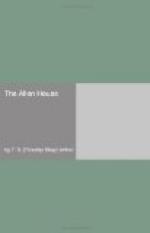“What general bodily sensation have you? Any that you can speak of definitely?”
“None, except a sense of oppression and heaviness. When I raise my arm, it seems to fall like lead; if I move about, I am weary, and wish to be at rest.”
“Rest is, by all means, the most desirable condition for you now,” said I. Then addressing her mother, I added—“I think your daughter had better lie down. Let her room be shaded and kept quiet. She needs rest and sleep. Sleep is one of nature’s great restorers.”
“Will you make no prescription, Doctor?” the mother asked.
I reflected on the symptoms exhibited, for a few moments, and then said,
“Nothing beyond repose, now. I trust that nature, as the pressure is removed, will work all right again.”
“You will call in again to-day.”
“Yes; towards evening I will see your daughter, when I hope to find her improved in every way.”
I spoke with a cheerfulness of manner that did not altogether express my feelings in the case; for, there were some indications, not yet clear enough for a diagnosis, that awakened slight concern. As I did not wish to go wrong in my first prescription, I deemed it better to wait a few hours, and see how nature would succeed in her efforts to repel the enemy. So I went away, with a promise to call again early in the afternoon.
CHAPTER IX.
It was between four and five o’clock in the afternoon, when I called again at the Allen House. An old colored servant, who had been in the family ever since my remembrance—she went by the name of “Aunty”—was standing by the gate as I alighted from my chaise.
“’Deed, massa, Ise glad you come,” said she in a troubled way.
“Why so, Aunty? No body very sick, I hope.”
“’Deed, an dar is den; else old Aunty don’t know nothin’.”
“Who?”
“Why dat blessed young lady what drapped in among us, as if she’d come right down from Heaven. I was jest a gwine to run down an’ ax you to come and see her right away.”
I did not linger to talk with “Aunty,” but went forward to the house. The mother of Blanche met me at the door. She looked very anxious.
“How is your daughter now?” I asked.
“Not so well as when you saw her this morning,” she answered. Her voice trembled.
“I would have called earlier, but have been visiting a patient several miles away.”
“She has been lying in a kind of stupor ever since you were here. What can it mean, Doctor?”
The mother looked intently in my face, and paused for an answer, with her lips apart. But I knew as little as she what it meant. Ah! how often do anxious friends question us, and hearken eagerly for our replies, when the signs of disease are yet too indefinite for any clear diagnosis!
“I can tell better after seeing your daughter,” said I. And we went up to the sick girl’s chamber; that north-west room, at the window of which I had first seen the fair stranger, as I stood wondering in storm and darkness. I found her lying in apparent sleep, and breathing heavily. Her face was flushed; and I noticed the peculiar odor that usually accompanies an eruptive fever.




